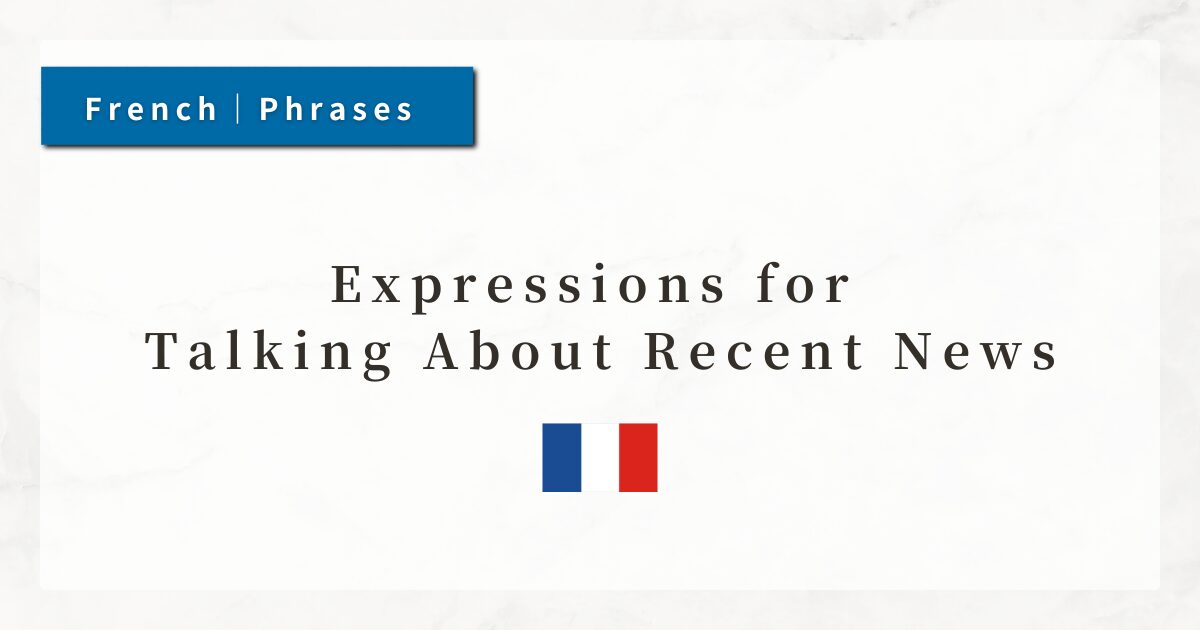#64 Explaining the Agenda in a Meeting|French Business Conversation

In business settings, it is common to explain the agenda at the beginning of a meeting by saying, “Today’s agenda is …”.
Being able to present the agenda in French and organize the flow of discussion will make meetings run more smoothly.
In this lesson, I will introduce useful French expressions for presenting the agenda at the beginning of a meeting and for clarifying discussion points during the meeting.
Dialogue

Bonjour à tous. Aujourd’hui, nous allons discuter de plusieurs points importants.
(Hello everyone. Today, we are going to discuss several important points.)

Très bien. Quels sont les sujets principaux ?
(All right. What are the main topics?)

D’abord, nous allons parler du budget pour l’année prochaine. Ensuite, nous aborderons la stratégie marketing.
(First, we will discuss the budget for next year. Then, we will address the marketing strategy.)

D’accord, merci pour cette clarification.
(Understood, thank you for the clarification.)
1. Words for “Agenda” in French
French has several words to express “agenda,” each with slightly different nuances depending on the context.
- l’ordre du jour → the overall meeting agenda)
- un sujet → a subject or topic
- un point → an agenda item, a point
Use “l’ordre du jour” when referring to the complete list of items, and “un sujet” or “un point” when referring to individual topics.
- Voici l’ordre du jour de la réunion.
(Here is the agenda for today’s meeting.) - Le premier sujet concerne le budget.
(The first topic concerns the budget.) - Nous allons discuter du troisième point.
(We will discuss the third item.)
2. Common Phrases for Introducing the Agenda
At the beginning of a meeting, it is important to present the agenda and outline the flow.
- Aujourd’hui, nous allons discuter de …
(Today, we will discuss …) - Nous avons plusieurs points à aborder.
(We have several items to address.) - Tout d’abord / Ensuite / Enfin …
(First … / Next … / Finally …)
Using these “linking expressions” helps make the structure of the meeting clear and easy to follow.
3. Different Verbs for “To Explain”
During a meeting, you often need to “explain” an agenda item. French offers several verbs, each with a different nuance:
- expliquer → to explain
- clarifier → to clarify, make clearer
- préciser → to specify, to give details
- Je vais expliquer le deuxième point.
(I will explain the second item.) - Merci pour cette clarification.
(Thank you for the clarification.) - Je voudrais préciser un détail important.
(I would like to specify an important detail.)
4. Expressions for Changing Agenda Items
Since multiple agenda items are usually covered, it is useful to have phrases for shifting topics smoothly.
- Passons au point suivant.
(Let’s move on to the next item.) - Le deuxième sujet est …
(The second topic is …) - Maintenant, parlons de …
(Now, let’s talk about …)
“Passons …” is especially common for chairpersons or moderators to guide the flow of the meeting.
Summary
- l’ordre du jour / un sujet / un point
→ the basic words for “agenda.” - Aujourd’hui, nous allons discuter de …
→ a standard phrase for introducing the agenda. - Tout d’abord / Ensuite / Enfin
→ useful linking expressions to structure the discussion. - expliquer / clarifier / préciser
→ subtle differences in how to say “explain.” - Passons au point suivant. / Maintenant, parlons de …
→ practical phrases for moving between agenda items.




